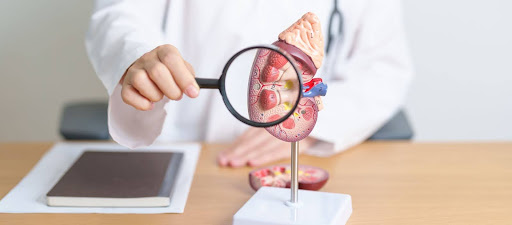
Adrenal cancer, though rare, can be a frightening diagnosis. Situated atop the kidneys, the adrenal glands play a crucial role in regulating various bodily functions, including metabolism, immune response, and stress management. When cancer infiltrates these vital glands, it disrupts the delicate balance of hormonal secretion and poses significant health challenges. Here at Alliance Urology, we are here to educate our patients and give an overview of adrenal cancer.
Understanding Adrenal Cancer
Adrenal cancer, also known as adrenocortical carcinoma (ACC), typically originates in the adrenal cortex—the outer layer of the adrenal glands responsible for producing hormones such as cortisol, aldosterone, and adrenaline. While it’s relatively rare, with an estimated incidence of 1-2 cases per million individuals annually, its impact can be profound.
According to the American Cancer Society, each adrenal gland has 2 parts. The cortex, which is the outer part, is where most tumors develop. The cortex makes certain hormones for the body including
- Cortisol: Causes changes in metabolism to help the body handle stress.
- Aldosterone: Helps the kidneys regulate the amount of salt in the blood and helps regulate blood pressure.
- Adrenal androgens: Can be converted to more common forms of the sex hormones estrogen and testosterone in other parts of the body. The testicles produce most of the androgens (male hormones) in men. The ovaries produce most of the estrogens (female hormones) in women.
Risk Factors And Symptoms
Identifying the risk factors and symptoms of adrenal cancer is crucial for early detection and treatment. While the exact cause remains largely unknown, certain predisposing factors such as genetic mutations (e.g., Li-Fraumeni syndrome) and hereditary conditions (e.g., Beckwith-Wiedemann syndrome) may elevate the risk. Additionally, prolonged exposure to certain environmental toxins or radiation may also play a role.
Symptoms of adrenal cancer can vary depending on the stage and location of the tumor. Common signs include
- Abdominal pain or mass
- Unexplained weight loss
- High blood pressure
- Irregular menstruation
- Excessive hair growth (hirsutism)
However, these symptoms are nonspecific and may mimic other benign conditions, making diagnosis challenging.
Diagnosis And Treatment
Diagnosing adrenal cancer often involves a combination of imaging tests, such as CT scans or an MRI, and laboratory analyses to assess hormone levels. Once confirmed, treatment typically entails surgical intervention to remove the tumor, often accompanied by therapies such as chemotherapy or radiation to target any remaining cancer cells.
Unfortunately, the prognosis for adrenal cancer can be grim, particularly in cases of advanced disease or metastasis. The five-year survival rate for localized disease is approximately 73%, but this drops for patients with regional (53%) or distant spread (38%). This makes early detection and aggressive treatment essential for improving outcomes in patients diagnosed with this type of cancer.
Challenges And Advances
One of the primary challenges in managing adrenal cancer lies in its rarity and the lack of standardized treatment protocols. Given its nature, each case may require a tailored approach based on factors such as tumor size, location, and hormonal activity. Moreover, the scarcity of clinical trials and research funding for this orphan disease further complicates therapeutic advancements.
Make An Appointment Today
Adrenal cancer may be rare, but its impact on individuals and families affected by the disease is profound. For individuals experiencing symptoms indicative of adrenal cancer, consulting with a healthcare professional is the crucial first step toward a diagnosis and tailored treatment plan. Alliance Urology Specialists is home to an expert team of urologists who are committed to providing comprehensive care to adults with urologic disorders, as well as other men’s health issues. If you have more questions about adrenal cancer, contact us today at (336) 274-1114 to make an appointment.

